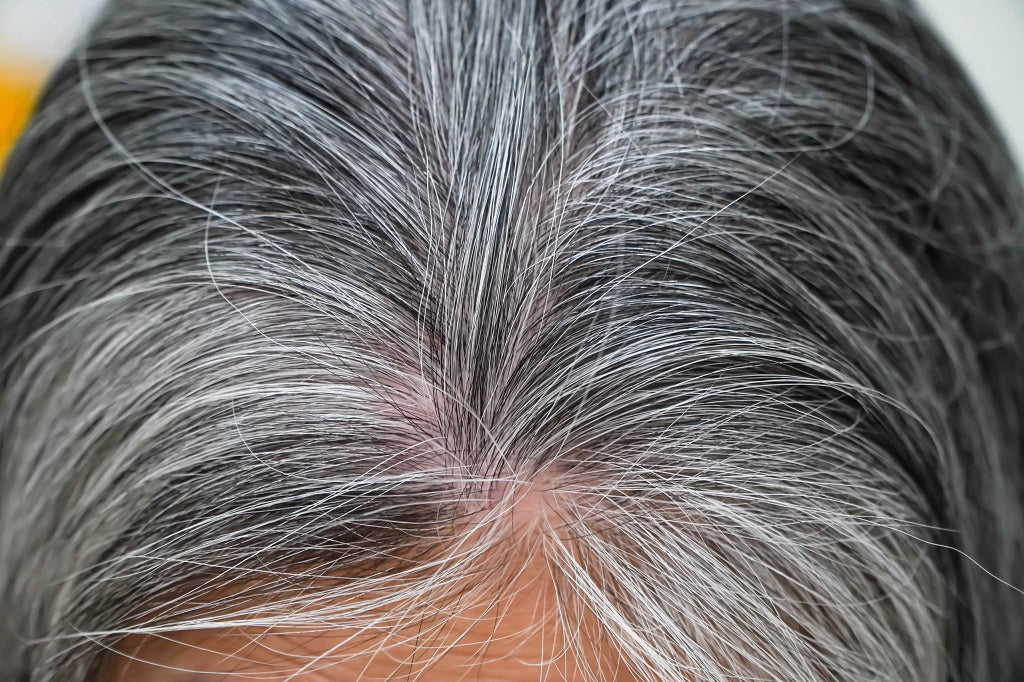
Premature Greying Of Hair

Dr. Deepthi Prasad, MBBS.
Written by Our Editorial Team
Table of Contents
Listen to the blog
Nothing can replace the joy of reading, right? Read the blog here.
Grey hair - understanding hair greying, pigmentation & more
Healthy hair is a sign not just of a healthy hair scalp, but also of the general well-being of a human being. When it comes to grey hair, it can surely hit the self-esteem of an individual. However, premature greying of hair is a whole issue on its own. So what is premature greying of hair? Well, Premature greying of hair is when your hair starts to turn white before the age of 30 in the Indian diaspora, however, the age might vary for different racial groups according to their genetics. The exact reason why this happens is still unknown. Greying of hair is also called canities or achromotrichia, which occurs with normal ageing. Let's try to understand more about this.
Hair pigmentation
Hair pigmentation is one of the most unique features of humans ranging from black, brown, and blonde to red. The colour of human hair is due to a pigment called melanin produced by melanocytes. Once made, melanin travels to other cells throughout your body. Melanin provides the pigment in your skin, hair and eyes.
Melanocytes produce two types of melanin that help determine the overall pigmentation that you have:
- Eumelanin: This type of melanin primarily makes dark colours in your hair, skin and eyes.
- Pheomelanin: This type of melanin primarily makes pink or red colours in your body, including lips, nipples, the vagina and the bulbous structure at the end of the penis (glans), as well as hair.
As you get older, the amount of pigment in your hair follicles reduces. As a result, your hair turns grey and eventually white. But in the case of premature greying, there are so many factors at play.

Factors for premature greying of hair
Premature greying of hair can be due to deficiency of vitamin B, vitamin D, vitamin E or biotin, oxidative stress and lifestyle stress might also serve as a reason.
1. Hereditary: One of the most common and major factors responsible for premature grey hair. The greying gene grows from birth onward, when it finally starts to show up physically it is hard to turn it back to the original stage.
2. Melanin production: Low or No production of melanin can also be a cause for premature greying of hair. The gradual decrease of melanin production on the cell surface and the type of melanin being reduced will also decide the greying of hair.
3. Stress: Stress is something that can affect anyone at any time. The kind of stress you are going through will determine how your body looks, and how your hormones and hair behave. Stress can take a toll on your hair growth and lead to premature greying of hair.
Also Read : Stress Can Turn Your Hair Grey: Reverse It!
4. Lack of nutrition: Vitamin B 12 is a necessary vitamin that promotes the nervous system, health, and brain function as well as the development of cardiac muscles. It also aids in the creation of red blood cell, which helps nutrients transport from one part of the body to other. Vitamin B 12 deficiency is also called pernicious anaemia, where your body can't absorb enough of this vitamin. Which weakens hair cells and affects melanin production. This can have an impact on your hair health and accelerate greying of hair.
5. Smoking: It is well known that smoking cigarettes increase the risk of lung cancer and skin diseases. The long-term effect however can go beyond the heart and lungs and affect the hair. Smoking constricts blood vessels which can reduce the blood flow to hair follicles and cause hair loss. Additionally, the toxins in cigarettes can damage the hair follicles causing early onset of greying.

6. Autoimmune disorder: An autoimmune disorder can also cause premature greying of hair. This is when the body’s immune system attacks its cells. In the case of alopecia and vitiligo, the immune system can attack hair and cause loss of pigment.
Also Read : Why Do I Have Grey Hair In My 20's?
Can premature greying of hair be prevented?
The cause of the white hairs decides if it can be reversed or not. If the cause is genetics, there isn't anything you can do to prevent or permanently reverse the colour change.
In case of underlying health issues, the greying can be reduced or even reversed by healing that pertaining condition.
When the thyroid causes premature greying of hair, there are chances for re-pigmentation through hormone therapy treatment. Vitamin B 12 shots or pills are also used to correct the deficiency and improve the general health of the hair follicles. If your white hairs are due to stress or smoking there isn't much evidence to support the return of pigmentation of the hair.
Melamine is one option that can be used to reverse greying/ but it should be taken under the supervision of a dermatologist and one should be aware that greying can reoccur once the person stops using it.
Using antioxidant-rich plant-based formulations that help protect hair from free radicals by reducing and neutralizing them also helps in maintaining the hair colour.
ThriveCo Hair Prime Serum, a anti-grey hair serum, contains Arcolys that works from the hair follicles to bring back the hair's natural colour. It progressively recovers the hair's dark hue by promoting melanin production at the roots. It inhibits hair whitening by limiting oxidative stress at the scalp and helps with the growth of darker, shinier hair.
Buy ThriveCo Hair Prime Serum
About Doctor :

Dr. Deepthi Prasad specializes in Dermatology, Cosmetology, and Aesthetic Dermatology and has been practicing for over 15 years. After completing MBBS from Dr. NTR University of Health Sciences Andhra Pradesh in 2009, she earned a MD in Dermatology, Venereology & Leprosy from Osmania Medical College in Hyderabad in 2014.
Disclaimer:All the content published on www.thriveco.in is solely for information purposes. It is not a substitute for professional medical advice, diagnosis, or treatment. Always consider seeking the advice of your physician or a qualified healthcare provider. The information, suggestion, or remedies mentioned on this site are provided without warranty of any kind, whether express or implied.
 PAYDAY SALE:EXTRA 15% OFF. Coupon PAYDAY
PAYDAY SALE:EXTRA 15% OFF. Coupon PAYDAY 






